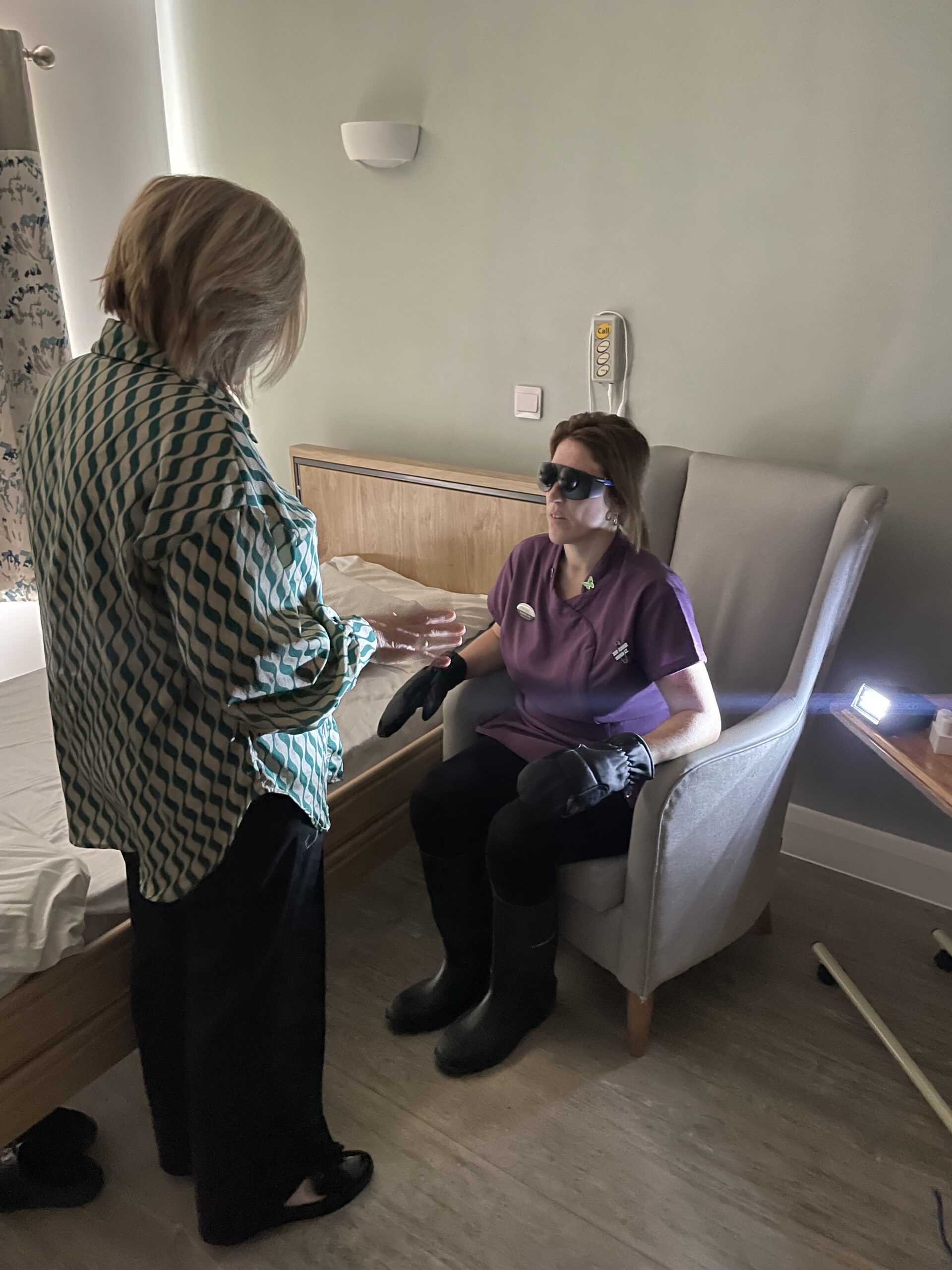Care Homes vs. Home Care: Which is Best For Your Loved One?
It is widely known that the coronavirus outbreak has had a devastating impact on the elderly population of the United Kingdom. This has raised a very important question for many families with elderly loved ones: is it safer for them to live a limited, isolated life at home or to go into a care home?
We completely understand that this is a hard decision to make during normal circumstances, and an even harder one in the current health crisis and economic climate. It is a decision that is entirely based on the needs and wishes of your loved one and their family – each circumstance is different and intensely personal.
What we hope to do in this blog post is to give you some food for thought when it comes to choosing between a care home and home care while we continue to feel the repercussions of COVID-19.
If you would like to speak to a member of our team about your own situation, please feel free to call our head office on 0208 953 7600 or contact one of our care homes directly.
Home Care for the Elderly
Care at home is often the first preference for elderly people who need some assistance as they get older. If they don’t have any serious medical issues, having a professional carer visit them at home allows them to continue living in a familiar environment and stick to their routines.
Often older people are understandably attached to their homes and belongings because of the dear memories they hold, and they worry that relocating will mean clearing away their memories, giving up their independence and saying goodbye to pets, hobbies and other passions that make them who they are. These are common worries that we address regularly in our care homes – we have a number of initiatives in place that allow our residents to maintain their sense of self, purpose and independence when they come to stay with us.

Care at home tends to work best when an elderly loved one has a network of family around them who can pop in regularly to check on them. This ensures that the family can monitor whether or not their loved one is getting the right kind of care at the right frequency, especially if they are living with dementia and aren’t necessarily able to give a balanced assessment themselves. It also means that they don’t miss out on regular social interaction, helping to prevent the emotional and medical implications of loneliness.
Loneliness in the elderly: the next pandemic?
Although this model works very well under normal circumstances, it is put under extreme pressure by the realities of life under lockdown. In March 2020, the Government announced that all people over the age of 70 should practise shielding – avoiding all contact with others whenever possible – for three months during the peak of the pandemic.
Many of the most vulnerable elderly people in our society went months living alone with only very limited social contact: picking up a bag of shopping from the doorstep and waving their thanks at the helper who dropped it off; trying to work out how to use video chat, feeling out of their depth and hopeless with no one to help them when it didn’t work; spending hours in front of the television with nothing but the news to dwell on.
As noted in our blog post on loneliness during the coronavirus outbreak, social isolation and loneliness are proven to have a detrimental effect on our health, increasing the likelihood of developing depression, dementia and cardiovascular diseases as well as weakening the immune system. This is heartbreaking for those families who have been unable to visit their older loved ones during lockdown and are aware of the negative impact that social isolation has had – and continues to have – on their elderly relatives.

The long-term negative impact of social isolation
The most extreme form of social distancing has now been lifted (as of June 2020), but it is clear that there are many months of social limitations ahead for everyone in the UK. Cafes, restaurants, bingo halls, theatres, museums, community centres and other public spaces where elderly people are able to socialise and enjoy themselves still haven’t opened their doors. Concerns over spreading the virus may prevent people from visiting their vulnerable friends and relatives in fear of putting them at risk, leaving those living on their own in a state of isolation that is just as detrimental to their health.
If you are currently caring for an elderly loved one yourself, we recommend taking a look at Age UK’s resources. They have lots of really useful information about how to provide care safely during the coronavirus outbreak.
Many family members are also concerned that they don’t “have eyes on” the care that their loved ones are receiving at home. It is much harder to know whether or not an older person’s physical or mental state is deteriorating when they only get an hour or so of face-to-face contact a day with a carer, who may not be aware of their personal history.
If you have any of these concerns, it may be time to consider residential or nursing care for your loved one, or more specialist dementia care or palliative care.
The Benefits of Residential Care
There is no escaping the fact that there has been a considerable amount of negative press around the care home sector throughout the coronavirus outbreak – ignoring it would be disregarding a conspicuous elephant in the room. However, there are some important arguments in favour of choosing a care home at this time rather than relying on care at home for your loved one.
1. A custom-adapted environment to keep the elderly safe
One of the big worries, when it comes to leaving a lifelong home, is that an older person won’t feel comfortable in their new environment. In actual fact, moving from a large, old house that needs regular maintenance and cleaning to a care home fitted with lifts and specialist medical equipment can take a considerable load off their mind.
All of our care homes are purpose-built or adapted specially for the elderly, offering clean, airy bedrooms and a range of facilities on site that allow considerably more freedom for your loved one. For example, Riverdale Care Home has its own café, hair salon, library and even a traditional pub – and none of these well-loved establishments have had to shut their doors during lockdown!

The health and wellbeing of our residents continues to be our number one priority. Our precautionary measures, in line with the latest guidance and advice published by the Government and Public Health England, include:
- Outfitting all of our staff in the right Personal Protective Equipment (PPE), including fluid repellent face masks on a sessional basis, as well as disposable aprons and gloves
- Testing for COVID-19 under the test, track and trace programme for all residents and staff members
- Daily temperature checks for all staff, residents and visitors
- Heightened cleaning procedures and infection control training in place for all staff, plus regular audits of procedures and handwashing
- And much more
For the most up-to-date information on our coronavirus policies and procedures, take a look at the most recent ‘Coronavirus Latest Update’ post on the News section of our website.
2. Trained experts and continuity of care
An area of anxiety with homecare, that has come to the forefront during the pandemic, is that family members are not able to make regular checks on their loved ones as they could before. Only those who are very familiar with an elderly person are likely to notice if they eat less, sleep more, forget to take their tablets at the right time or show any other indications of declining physical or mental health.
This is a considerable benefit of residential care. Families can rest assured that their loved ones are in a monitored environment with 24/7 access to medical staff. Custom meal plans can be confirmed and the taking of medication can be supervised to ensure that your older relative lives as healthily as they can, and the continuity of care provided by a care home means that any changes in their health are much more likely to be spotted and dealt with quickly.

3. Navigating the challenges of modern communication
Having staff on-hand at all times also means that we are able to assist our residents when it comes to getting to grips with technology. We have invested in additional iPads and facilitate regular video calls with family members, allowing our residents to see and speak to their loved ones.
It may seem small in the grand scheme of things but having a tech-savvy helper on hand to make sense of an iPad relieves any anxiety an older person may have about using technology and allows them to spend much-needed time with their family online. Sanitising the iPads between uses, and keeping them charged, takes a weight off the minds of both an elderly person and their relatives.

4. Staying social with residents and staff
Perhaps the standout benefit of living in a care home during the current circumstances is the amount of socialisation that residents can enjoy. It has been our mission to engage and entertain all of our residents during this challenging time, and we’re very proud of the hard work that our teams have put into creating a programme of lockdown-friendly events.
From pet therapy and garden parties to arts and crafts projects and our very own Ashview Olympic Games, the residents in our care homes have made memories and shared laughter over the past few months. We firmly believe that there is no substitute for real, meaningful personal interaction!



To keep up to date with all the latest goings-on at our care homes, ‘like’ the Westgate Healthcare Facebook page.
A Personal Decision
When it comes to deciding between a care home and home care, we understand that there are multiple factors that go into making the decision. The physical and mental health of your loved one is always paramount. If there is any way that we can make the decision process easier, please do not hesitate to get in touch. We would love to help you find a solution that allows your loved one to live a happier, healthier life.

